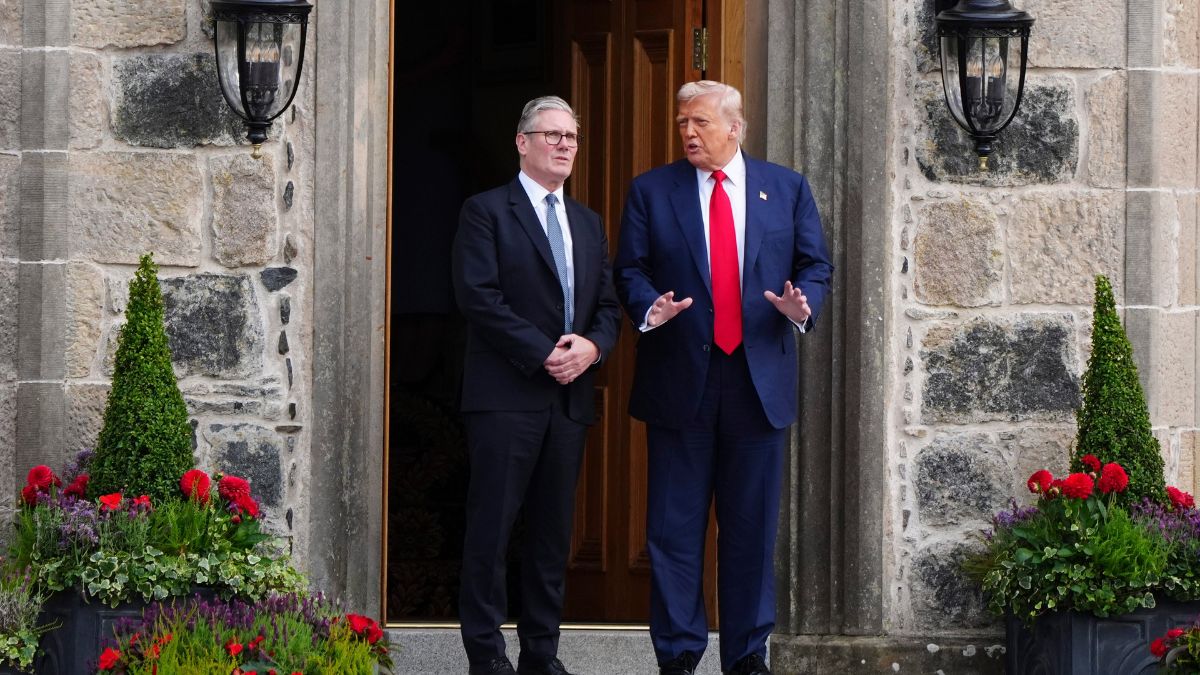Donald Trump finally acknowledges Gaza starvation, faces pressure to act
 US President Donald Trump, right, and British Prime Minister Keir Starmer walk at Trump International Golf Links in Aberdeenshire, Scotland | AP
US President Donald Trump, right, and British Prime Minister Keir Starmer walk at Trump International Golf Links in Aberdeenshire, Scotland | AP
President Donald Trump has, for the first time, publicly acknowledged that Gaza is facing a starvation crisis, after months of deflection and reluctance to criticise Israeli military policy. Speaking in Scotland yesterday, along with British Prime Minister Keir Starmer, Trump said there was “real starvation” in the enclave and promised to set up new food distribution centres with British assistance. However, he offered little clarity on how the United States intended to deliver aid into the devastated territory. Trump is spending four days in Scotland on a private visit.
“We’re giving money and things,” he told reporters during a 75-minute press session. “I want to make sure they get the food, every ounce of food.”
Trump’s comments came after a weekend of renewed international concern over the worsening humanitarian situation in Gaza, where more than 20 months of Israeli bombardment and aid restrictions have left nearly two million Palestinians in desperate need. His shift in tone followed meetings with several European leaders, including Starmer and European Commission President Ursula von der Leyen, who urged stronger US engagement in addressing the crisis.
Trump described the food crisis in stark terms. “That’s real starvation stuff, I see it, and you can’t fake that. We have to get the kids fed,” he said. His remarks appeared to have been influenced by Starmer’s intervention, who expressed “a sense of revulsion” over images of starving Palestinian children.
Trump criticised the existing aid delivery efforts, including those backed by his own administration. He said he would push for new food centres in Gaza that would be more accessible, without fences or barriers. “They see the food. It’s all there, but nobody’s at it because they have fences set up that nobody can even get through. It’s crazy what’s going on over there,” he said.
The change in posture was notable. Until recently, Trump had largely focused on condemning Hamas and shifting blame away from Israel. During a White House meeting three weeks earlier with Israeli Prime Minister Benjamin Netanyahu, the president avoided discussion of Gaza’s food crisis and instead praised Israel’s conduct while accusing Hamas of obstructing peace negotiations.
Trump’s silence on the issue stood in contrast to other world leaders. When French President Emmanuel Macron said last week that the threat of mass starvation had influenced his decision to recognise a Palestinian state, Trump dismissed the move as insignificant. “What he says doesn’t matter. That statement doesn’t carry any weight,” he said at the time.
Meanwhile, Netanyahu continues to deny that Israel is deliberately starving Gaza’s civilian population. He dismissed accusations of starvation as “a bold-faced lie,” insisting that humanitarian aid had been flowing into Gaza throughout the conflict. “There is no policy of starvation in Gaza, and there is no starvation in Gaza,” Netanyahu said, accusing Hamas of intercepting supplies and spreading misinformation.
Israel’s military announced what it described as a “local tactical pause” in Gaza to facilitate aid delivery. It also reopened designated corridors for UN convoys and allowed foreign governments to resume airdrops of food and supplies. However, humanitarian agencies have warned that these methods remain insufficient, dangerous, and uncoordinated.
UN agencies, including the World Health Organization, reported a sharp increase in deaths from malnutrition in July. Of the 74 recorded malnutrition-related deaths this year, 63 occurred this month alone, including 25 children. The WHO said most victims had died shortly after reaching health facilities or were declared dead on arrival, showing clear signs of severe wasting.
“This crisis is entirely preventable,” the agency said in a statement, blaming the “deliberate blocking and delay of large-scale food, health, and humanitarian aid.”
Claims that Hamas has been stealing aid have also been challenged. The New York Times reported recently that senior Israeli military officials had found no evidence of systematic theft by Hamas. A separate U.S. intelligence assessment, cited by Reuters, reached a similar conclusion.
Despite this, Trump now faces growing domestic criticism over his handling of aid distribution in Gaza. Twenty-one Senate Democrats have called for an immediate suspension of funding to the Gaza Humanitarian Foundation, a controversial aid organisation backed by the US and Israel. In a letter to the White House, the senators accused the foundation of blurring the lines between humanitarian relief and military operations, leading to civilian deaths and violating international law.
Since its launch in May, the foundation’s four distribution sites have been linked to the deaths of at least 766 people trying to access food, according to UN human rights officials. Thousands more have been injured, and over 1,000 people are believed to have died while seeking food in general. Reports also allege that US security contractors hired to guard the sites have used live ammunition and stun grenades on desperate crowds. “Civilians have been fired at by tanks, drones and helicopters as they attempt to get food,” the senators wrote.
As criticism mounts and the humanitarian crisis deepens, Trump’s promise of new food centres and stronger international cooperation will be tested in the weeks ahead. For now, his belated acknowledgement of the suffering in Gaza has done little to ease growing global outrage. “We’re going to fix it,” Trump said in Scotland. “This isn’t how we feed children.”
Middle East